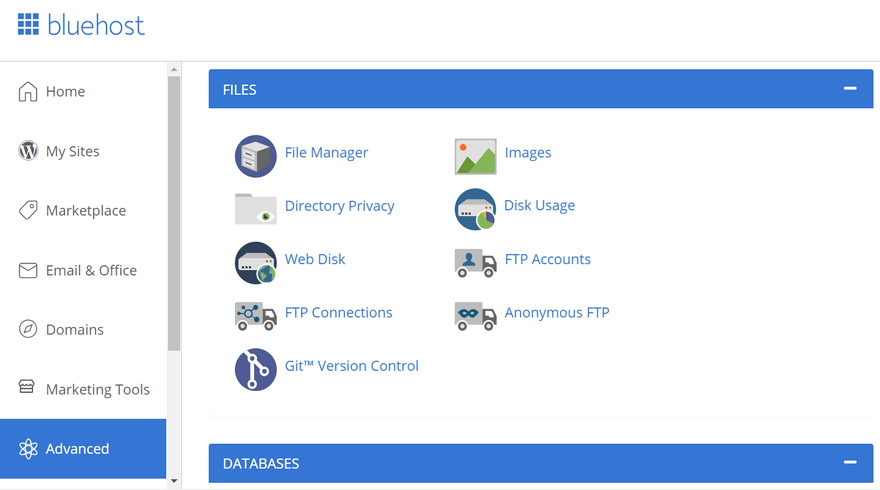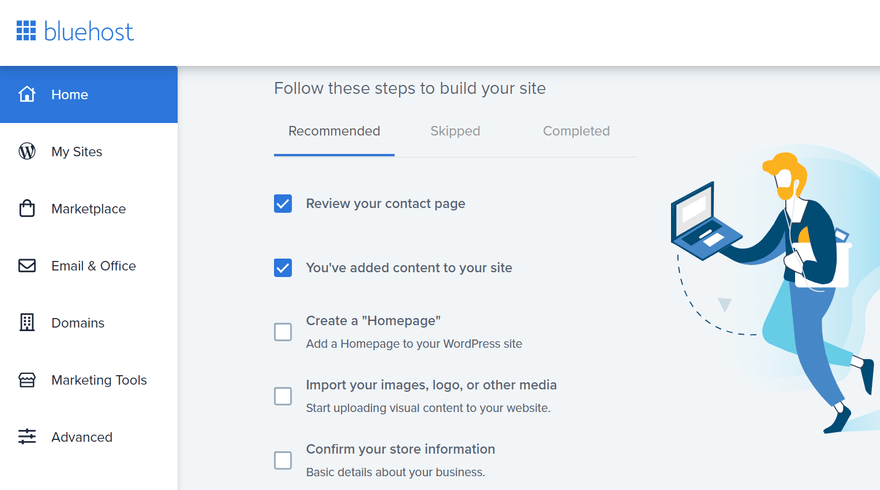DreamHost vs Bluehost: The Right Hosting Provider for You
Our independent research projects and impartial reviews are funded in part by affiliate commissions, at no extra cost to our readers. Learn more
We know that choosing the right website hosting provider can feel like trying to find a needle in a virtual haystack. We can definitively say that Bluehost is the better provider overall, with excellent ease of use and superb WordPress integration. But don’t count DreamHost out completely – read on to see why its uptime, security features and shared hosting plans impressed us, too.
| Bluehost | DreamHost |
| Overall rating 4.8 | Overall rating 4.4 |
| Starting from $2.95 | Starting from $2.95 |
| Uptime 99.98% | Uptime 100% |
| Money-back guarantee 30 days | Money-back guarantee 97 days |
| Storage space 10GB – Unlimited | Storage space 50GB – Unlimited |
| Bandwidth Unmetered | Bandwidth Unmetered |
| RAM 2GB – 16GB | RAM 1GB – 16GB |
| Visit Bluehost | Visit DreamHost |
Who Should Use Bluehost?
- Anyone hosting a WordPress site
- Anyone wanting to get set up quickly
- Anyone wanting to grow their website
- Anyone looking to sell or create a lot of content
Who Should Use DreamHost?
- Anyone looking for cheap shared hosting
- Anyone concerned with uptime
- Anyone creating a small site or personal portfolio
- Anyone who prefers online support to phone support
Before we get into the details, ever wondered how many sites are running on each host? As of July 2023, there were 4.5 million Bluehost customers, and just over 1 million using DreamHost, since the inception of both hosting providers. But just because Bluehost is more popular doesn’t make it right for your website needs, below we’ll analyze both hosts strengths and weakness’.
There are a few different types of web hosting out there, and the main difference has to do with the amount of server space and resources each type can provide.
- Shared hosting means your website is hosted on the same server as other sites, and you share resources like storage and bandwidth.
- WordPress hosting is shared hosting, specifically optimized for WordPress websites.
- Cloud hosting is similar to shared hosting, but resources are shared between a network of connected servers, rather than just one. Cloud hosting is very reliable, because the burden of uptime is shared between servers.
- VPS hosting stands for virtual private server hosting, and it’s basically a shared server that mimics the environment of a dedicated server. This means more resources will be allocated to your site, but you won’t be paying the price of a real dedicated server.
- Reseller hosting is a little different from the rest. In this model, you’d purchase server space from Bluehost or iPage, but not to use yourself – you’d actually then rent it out to other people, as a sort of business model.
- Dedicated hosting is the real version of what VPS hosting is mimicking. With dedicated hosting, you get an entire server to yourself – all of its resources are dedicated to your website.
Bluehost vs DreamHost: Quick Comparison
Overall during testing we found that Bluehost scores a 4.8 out of 5, across shared, VPS, dedicated and WordPress plans. Comparatively, DreamHost got a respectable 4.4 out of 5. Look in detail why they got those scores in our comparison chart below:
| Bluehost | DreamHost | |
|---|---|---|
| Features, Performance, & Ease of Use Winner: Bluehost | Bluehost has a large number of features to enjoy and great performance across its plans. The only area where DreamHost is the clear winner is for shared hosting, but otherwise Bluehost has the majority for VPS and dedicated, along with easy WordPress integration. | DreamHost has wonderful features for shared hosting like a 100% uptime guarantee, 97-day money-back guarantee, unlimited bandwidth, and daily automatic backups. But Bluehost wins as it has more scalable plans and features for all types of websites. |
| Pricing & Value for Money Winner: Bluehost | Bluehost's hosting plans are extremely cost-effective, and its renewal prices are very competitive. Bluehost also offers a 30-day money-back guarantee. | Once again DreamHost has cost effective plans for shared hosting, gaining higher value than Bluehost in testing. That said, its VPS plans and dedicated plans are less valuable than Bluehost. |
| WordPress integration Winner: Bluehost | Bluehost is the top performing host for WordPress integration. Simply integrate WordPress in one click, and it's even recommended by WordPress! | DreamHost is able to integrate with WordPress, but in testing, it came in at joint fifth place for its WordPress hosting capabilities out of all the hosting providers tested. |
| Migration Winner: DreamHost | Bluehost offers the ability to migrate up to five websites and 20 email accounts for $149.99. All it takes is a few clicks, and Bluehost's support team will be on hand throughout the process. | DreamHost wins this round thanks to its free automatic migration plugin, along with free daily backups which Bluehost doesn't offer on cheaper plans. |
| Help and Support Winner: Bluehost | Bluehost has excellent help and support options, including an awesome knowledge center, 24/7 phone, live chat, and email services. | DreamHost offers 24/7 live chat and email support, but loses points for not having phone support. But if you prefer, DreamHost does have a community center and knowledge base on hand to help with simple questions. |
| Are You Ready? | Bluehost | DreamHost |
Still feeling unsure which hosting provider might be right for your website needs? We put together this quick quiz to help you find the right provider for you:
Features, Performance and Ease of Use
The Winner
Bluehost has better features and is easier to use.
You can get started with either Bluehost or DreamHost in just a few minutes. In both cases, the first step will be choosing a domain name for your website.
Ease of Use
Both DreamHost and Bluehost are easy to use, but Bluehost wins for its easy integration with WordPress and ability to use cPanel. But before that let’s go over each of the sign up processes.
If you already own a domain name that you want to use, you can enter it at this stage and then transfer your domain name once you’re all signed up.
At the first stage with Bluehost you’ll need to add in all your account details along with credit card information. Similar to a website builder on an annual plan, you need to pay upfront for the annual bill.
If you’re choosing a new domain, you can purchase and register it directly through either host. Not all web hosts also function as domain name registrars, so Bluehost and DreamHost both get bonus points for the added convenience of letting you manage your hosting and domains in one place.
Next, it’s time to check out. Both hosts will ask for your billing information, phone number, and email address at this stage, and then you’re done!
DreamHost vs Bluehost: Sign Up Process
Author Top Tip:
“Keep an eye out for additional costs on the checkout page! Both Bluehost and DreamHost can sometimes add some features to your cart at this stage, and while a lot of them are useful, they won’t always be tools that you really need. Be sure to remove any unnecessary purchases from your final total!”
Managing Your Site
Bluehost uses a popular software called cPanel to power your account dashboard, and provide you with website management tools. According to Builtwith, there are over 4 million websites that use cPanel and nearly 1,500,000 live websites using it.

The cPanel interface is clean and easy to navigate, whether you want to manage your website’s files (pictured), add a new domain, or browse new themes and plugins for your site.
In the “Home” tab on the left hand menu, you’ll even find a handy checklist for setting up your site:

DreamHost, on the other hand, doesn’t use the cPanel software. Instead, it uses its own custom-built panel, which can perform most of the same functions.
Similar to cPanel, the DreamHost control panel has a clear navigation menu on the left side of the dashboard. From there, you can manage your domains, email addresses, and billing information.
Overall, the DreamHost control panel is pretty easy to use, there’s even a drop-down menu with links to support options, including the DreamHost knowledge base. Still, Bluehost takes the cake on this one because the cPanel dashboard is so clear – and it’s also widely used, so if you ever want to switch hosts in the future, chances are you won’t have to adapt to a new management system!
Features
Overall for features, Bluehost receives a score of 4.2 out of 5 and DreamHost gets a great 4.3 out of 5. For shared hosting DreamHost receives a feature score of 3.9 out of 5, and Bluehost 3.3 out of 5. That’s because DreamHost is tailored for smaller websites with a jam-packed feature list including 100% uptime, a free automatic migration plugin, and unlimited bandwidth.
But that’s not to say that Bluehost doesn’t have any useful features, in testing it scored better for VPS, dedicated, and WordPress features. Because Bluehost is more for larger websites, it makes it ideal for those who need extra storage and better help and support. Here’s a quick overview of the shared hosting features:
| Bluehost | DreamHost | |
|---|---|---|
| Money-back guarantee | 30 days | 97 days |
| Free domain | Yes | Yes |
| Control panel | cPanel | Custom Panel |
| Free backups | No | Yes |
| Storage space | 10GB | 50GB |
| SSL certificate | Yes | Yes |
| Bandwidth | Unmetered | Unlimited |
| Uptime | 99.98% | 100% |
Bluehost also includes a free content delivery network, or CDN, which ensures that your website loads quickly – regardless of where in the world your visitors are coming from. You’ll also score up to $150 in Google Ads credit, to help you promote your site.
Author Tip:
“For hosting a WordPress website, I recommend Bluehost. Bluehost ranks number one as far as WordPress hosts go, because of its automated software updates and one-click installation. The fact that it’s officially recommended by WordPress doesn’t hurt, either!”
Uptime
DreamHost scores 4.5 out of 5 for uptime performance, compared to Bluehost’s score of 3 out of 5. Overall performance is a win for DreamHost, which provides the most thorough uptime and security features to keep your site running smoothly.
Uptime refers to the amount of time per year that your website is live and accessible to visitors without any issues. It’s a really important factor in a website’s success, because an unreliable website can cost you loyal visitors – and for ecommerce businesses, it can also cost you revenue.
It was once impossible to guarantee 100% uptime, with hosting providers usually in the range of 99.97% – 99.99% uptime. Until DreamHost hit the 100% uptime guarantee! The typical range may not seem like a big range, but every little bit counts – a difference of just a few hundredths can actually translate into hours of extra downtime each year.
Further Information
- Interested in cPanel? Learn more about your options with our ranking of the best cPanel hosting providers.
- Purchasing a domain name for the first time? Find out how much a domain name costs.
Pricing
The Winner
Bluehost is better value than DreamHost
Both providers offer the three “main” types of hosting from shared, VPS, and dedicated. As well as WordPress and WooCommerce hosting, which are basically shared plans specifically optimized for WordPress sites and WordPress online stores, respectively.
If you’re interested in reseller hosting, you’ll want to look elsewhere – our ranking of the best reseller hosting providers is a good place to start. Bluehost does recommend ResellerClub as a third-party option, but neither Bluehost nor DreamHost offers in-house reseller hosting plans.
At a glance both introductory prices look exactly the same, but there’s more than meets the eye with Bluehost and DreamHost plans. Let’s take a look:
- Bluehost’s introductory prices start at $2.95 per month, and its renewal prices start at $7.99 per month
- DreamHost’s introductory prices start at $2.59 per month, and its renewal prices start at $5.99 per month
For example, DreamHost’s cheapest plan costs $2.59 per month, but only if you sign up for your first three years in advance, so you’ll have to pay $93.24 up front. If you sign up for one year in advance, the introductory price goes up a little bit to $2.95 per month, or $106.20 altogether.
However long that first term is – you’ll usually get to pick anywhere between six months and three years – the monthly price will renew at a set regular rate once it ends. This is called the renewal price.
For example, DreamHost’s cheapest plan costs $2.59 per month ($93.24 total) for the first three years, but that cost renews at $5.99 per month ($215.64 total) every three years after that.
Prices by Hosting Type
Let’s see how DreamHost vs Bluehost’s prices compare for each types of hosting we talked about earlier, going by introductory prices for each type when you pay yearly:
| Bluehost | DreamHost | |
|---|---|---|
| Shared | $2.95/month | $2.95/month |
| VPS | $34.99/month | $13.75/month |
| Dedicated | $109.97/month | $149/month |
| WordPress | $2.95/month | $16.95/month |
| WooCommerce | $9.95/month | $16.95/month |
Is Bluehost Better Value for Money?
Bluehost in testing scored 4.7 out of 5 overall for value, while DreamHost scored 4.2 out of 5 for value for money. Bluehost has the majority across all of its plans, earning a score of 3.9 out of 5 for VPS plans, and a whopping 4.4 out of 5 for value in its dedicated plans. While DreamHost comes out ahead in shared plans with a 4.4 out of 5, its VPS, dedicated, and WordPress plans are less value than Bluehost’s.
At a glance, DreamHost’s VPS prices are slightly cheaper than Bluehost’s, and its shared plans also start at the same rate. But cheapest doesn’t always mean best value, and a closer look shows that Bluehost’s plans give you more bang for your buck – along with being cheaper overall across the plans.
For a similar and overall cheaper plan Bluehost comes with:
- An easier-to-use interface and the widely popular cPanel software
- Superior live chat, knowledge base, and phone support
- Excellent WordPress integration
That’s why our research places Bluehost as the better value hosting provider.
Further Information
- Check out our rankings of the best cheap shared hosting, best cheap VPS hosting.
- See the best cheap dedicated hosting to save money, without sacrificing quality.
Security
The Winner
DreamHost has better security.
| Bluehost | DreamHost | |
|---|---|---|
| Typical uptime | 99.98% | 99.95% |
| Downtime per year (based on typical uptime) | ~One hour and 45 minutes | ~Four hours and 30 minutes |
Both Bluehost and DreamHost offer SSL certificates and good security options. When it comes to uptime, DreamHost defies expectations with 100% uptime, making it one of the leaders in the market. Its security is no different, offering some fantastic security even on the cheapest plan.
Website Backups
Backups are the easiest way to restore a previous version of your website in case anything goes wrong. Having an up-to-date backup of your site on hand is a great way to make sure your content is safe.
Of course, it’s even more convenient if you don’t have to remember to make these backups yourself – and that’s where DreamHost has you covered, offering automatic daily backups on all of its plans.
Bluehost makes its own backups of your site, but they’re not guaranteed (they’re more for Bluehost’s records) and will be overwritten with a new copy every 30 days – so you’ll still want to save copies yourself in the cPanel dashboard.
Security Measures
Both Bluehost and DreamHost include free SSL certificates on all of their hosting plans. SSL certificates keep your visitors’ data secure by encrypting the connection between their browsers and your web server.
Optional Security Products
The basic SSL certificates that Bluehost and DreamHost include on their plans should be sufficient for most websites. But if you want to go the extra mile in terms of security – for example, if you’re running an online store and want to reassure customers that their payment information is safe – then you can purchase a more advanced SSL certificate for your site.
- With DreamHost, you can add a professionally-signed SSL certificate from your account dashboard for $15 per year.
- With Bluehost, you can add a private SSL certificate from your account dashboard for $6.67 per month.
Further Information
- Discover the best free SSL hosting providers (spoiler alert: Bluehost is #1)
Migrating Domains and Websites
The Winner
DreamHost offers better migration
Thinking of switching your website to either Bluehost or DreamHost? Then we’ve got good news: both hosts offer a free, automated website migration service. However, your website will have to meet certain criteria in order to be eligible.
Migrating to Bluehost
Bluehost’s free migration service is available for most WordPress websites. If you qualify, an expert will move your site over for you.
You might not qualify if you’re using an old version of WordPress, or if your database is very large. In that case, you have two more options:
- You can use Bluehost’s paid migration service for $149.99
- You can move your website to Bluehost manually
Having to do a manual migration (that is, moving your site on your own) isn’t the most convenient way, but it’s definitely not too difficult to handle! The process mostly involves saving your website’s files to your computer, and then uploading them to your new host. If you decide to go down this route, we’ve written a guide on how to transfer website hosting that will help.
Migrating to DreamHost
DreamHost offers a paid website transfer service starting at $99. If you’d rather take the free route, DreamHost has an automated migration plugin that you can use to move a WordPress site. You’ll just need to be signed up for a DreamHost plan before you can install the plugin on your site.
What About Moving a Domain?
Bluehost lets you transfer domains with the following extensions: com, net, org, us, co, info, and biz. You can initiate the transfer easily from your Bluehost dashboard!
As for DreamHost, you’ll just have to follow the usual steps of manually transferring a domain name to a new host.
Help and Support
The Winner
Bluehost has better support than DreamHost
In testing, Bluehost had the best overall support score of 3.5 out of 5, comparitively DreamHost had just 2.3 out of 5. For shared plans specifically, Bluehost scores a lower 3.6 out of 5 in the help and support category, while DreamHost overshadows it with a decent 3.8 out of 5. However that’s not the only tests we did, for dedicated plans Bluehost has a help score of 4.5 out of 5, compared to DreamHost’s lower 3.3 out of 5.
Overall across all types of hosting, Bluehost is the winner. That’s because it provides phone support which DreamHost doesn’t. Let’s take a closer look at their support options.
Support Options
| Bluehost | DreamHost | |
|---|---|---|
| Phone | 24/7 | No* |
| Live chat | 24/7 | 3 AM - 9:30 PM PT |
| Knowledge base | Excellent | Good |
*DreamHost doesn’t offer direct phone support. In other words, you can’t call DreamHost yourself, but you can report an issue online and request a call back from the team.
Bluehost clearly has more support options than DreamHost – but customer support is often a quality over quantity situation, and the quality of Bluehost’s services is what pushes it to the front of the pack in this area.
When we tested Bluehost’s live chat feature, we were really impressed by how quickly the team got back to us, you’ll need some patience with the bot to begin but if you keep asking your questions then it should lead you to a team member who will direct you to the right information.

DreamHost’s live chat can sometimes have longer wait times during its available hours, but for the most part, we’ve still received responses in a few minutes or so.
How DreamHost and BlueHost Compare to Other Hosting Providers?
Compared to other hosting providers on the market, Bluehost stands out in testing as the best overall hosting provider. Soaring ahead with an overall score of 4.8 out of 5. That’s because Bluehost is consistently strong in features across hosting plans, great help and support, and excellent WordPress integration.
| Bluehost | GoDaddy | IONOS | SiteGround | Hostinger |
| Overall rating 4.8 | Overall rating 4.0 | Overall rating 4.0 | Overall rating 3.7 | Overall rating 3.6 |
| Starting from $2.95 | Starting from $6.99 | Starting from $0.50 | Starting from $2.99 | Starting from
$2.49 + 3 months free (with the 48-month plan) |
| Uptime 99.98% | Uptime 99.97% | Uptime 99.99% | Uptime 99.99% | Uptime 99.99% |
| Free backups | Free backups | Free backups | Free backups | Free backups |
| Free domain | Free domain | Free domain | Free domain | Free domain |
| Storage space 10GB – Unlimited | Storage space 25GB – 100GB | Storage space 25GB – Unlimited | Storage space 10GB – 160GB | Storage space 30GB – 200GB |
| Bandwidth Unmetered | Bandwidth Unmetered | Bandwidth Unlimited | Bandwidth Unmetered | Bandwidth 100GB – Unmetered |
| RAM 2GB – 16GB | RAM 512MB – 32GB | RAM 512MB – 12GB | RAM 16GB – 64GB | RAM 768MB – 16GB |
| Visit Bluehost | Visit GoDaddy | Visit IONOS | Visit SiteGround | Visit Hostinger |
Although Bluehost is an overall winner, it isn’t for everyone, with slower uptime than IONOS, Hostinger, and DreamHost – meaning you can expect a little more downtime for your site in the year.
Not to mention a higher starting price than IONOS, which has an impressive $0.50 plan. Also not in the chart above, HostGator is best for shared and small business, while InMotion is best for photography. Along with DreamHost’s best performing area was for blogging hosting, where it comes second in our rankings.
DreamHost didn’t reach our top hosting providers compared to others in the chart above, narrowly missing the list. It has an overall score of 4.4 out of 5 but does have the best value for money shared plans. But we recommend taking a look at HostGator if you need a shared plan as it has the best overall shared plans.
Although Bluehost is an overall winner, it isn’t for everyone, with slower uptime than IONOS, Hostinger, and DreamHost – meaning you can expect a little more downtime for your site in the year.
Not to mention a higher starting price than IONOS, which has an impressive $0.50 plan. Also not in the chart above, HostGator is best for shared and small business, while InMotion is best for photography. Along with DreamHost’s best performing area was for blogging hosting, where it comes second in our rankings.
DreamHost didn’t reach our top hosting providers compared to others in the chart above, narrowly missing the list. It has an overall score of 4.4 out of 5 but does have the best value for money shared plans. But we recommend taking a look at HostGator if you need a shared plan as it has the best overall shared plans.
DreamHost vs Bluehost: Summary
The clear winner between DreamHost and Bluehost is, Bluehost! It won plenty of categories in our testing, making it a great overall hosting provider. But DreamHost is a clear winner in the areas of features, uptime, security and migration.
Bluehost is the overall winner of the DreamHost vs Bluehost debate. Still, it won’t be the best fit for everyone. We recommend DreamHost for smaller websites on a budget who need an affordable, good value host to get their site off the ground. It is also good for those who need blogging hosting to create their blogs. Otherwise if you plan on creating a lot of content or selling through your website, slowly incrementing plans to receive more traffic – then Bluehost is definitely the better option.








Leave a comment